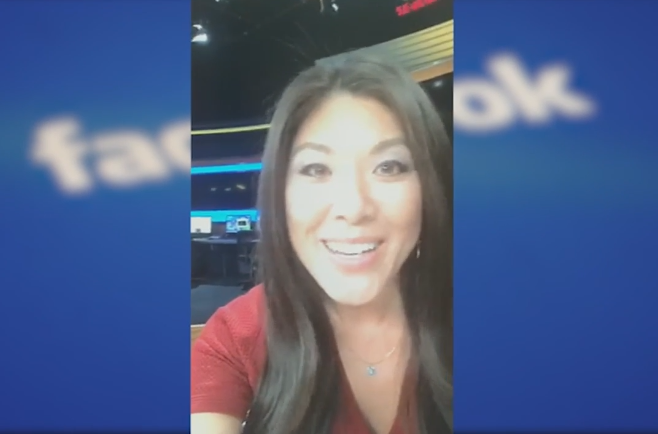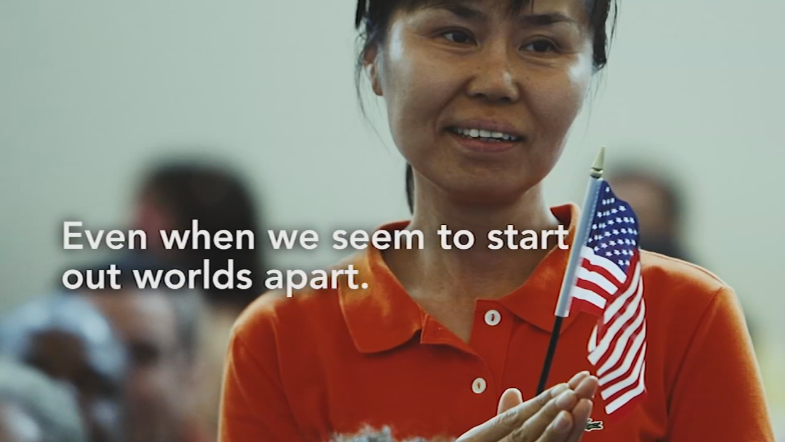By Aaron Mok
AsAmNews Intern
She’s bold, she’s confrontational, she’s a championing voice in the Asian American community — Nydia Han is on a mission to create a safer, more inclusive United States for minorities and people of color.
An award-winning Korean American reporter for 6ABC in Philadelphia, Han is using her platform to generate a constructive conversation about race in America. Her three-part series This is America takes a closer look at race relations nationwide, where she confronts racism at face value.
If you are an avid Facebook user, then you probably recognize Han from a video that went viral in September of 2017. Garnering almost 3 million views and 38,000 shares, her video was an emotional response to a motorist who allegedly yelled “This is America” at her after engaging in a brief altercation.
When I asked what it was about the phrase This is America that inspired her to produce this series, she made it clear that the interaction wasn’t exactly the catalyst. Rather, it was the abundance and diverse array of responses to her video that inspired her.
Respondents from a wide range of backgrounds– Asian Americans, African Americans, Latinx Americans, Native Americans, and even Caucasian Americans — expressed their solidarity with Han. Some of them, however, disagreed with her message. And it was the negative comments that really galvanized her.
“When I responded to that driver on Facebook, I was really responding to all the incidents where I have felt othered, and it was a really personal thing for me”, she says. “So I was surprised, I mean shocked really, by what a chord that struck with other people and other people with such diverse backgrounds.”
Han also produced the series with her kids in mind. Reflecting on that incident, she expressed her concerns about how crucial it is for kids growing up in America, especially those who come from minority backgrounds, to feel accepted.
“When that driver yelled at me, my first thought was “Thank god my kids aren’t with me,” she recounted. “How would I explain to my then three and four year olds why this woman would yell “This is America” at mommy, and how would I explain to them why this hurt mommy. And I don’t want my kids to feel othered, so I produced the series with them in mind, and with all of our kids in mind.”
Growing up in Ventura County, California, which at the time was a predominantly White neighborhood, Han vividly remembers instances where she felt “othered”. She recounts microaggressions received from her peers since Kindergarten. The “almond eyes gesture”, the “Chinese, Japanese, dirty knees” rhyme, the phrase “Chink” being thrown at her — it was interactions like these where Han recognized that people saw the Asian in her before the American.
Despite the offensiveness of these interactions, Han never felt that she experienced real discrimination towards her race. Acknowledging that they stem from a place of ignorance rather than hatred, she saw those encounters as an opportunity to educate her peers on what it means to be Korean American.
She describes an interaction on a bus where a fellow high school student asked her where she got her shoes. When Han told her she got them from Korea, the woman followed-up asking if Korea is a store at her local mall. Referring to that moment, Han states that “She didn’t mean any harm by it, she just didn’t know. And so I took it as an opportunity to explain to her that in fact, South Korea is a country and is where my ancestors are from.”
This sentiment that racial ignorance can be most effectively debunked by the exchange of personal experiences translates into Han’s underlying goal for her series. She hopes that This is America will encourage viewers to engage in productive conversations about race and to think critically about their own behavioral biases.
The feedback for the series, according to Han, has been primarily positive. Viewers see This is America as an important step towards embracing and accepting our differences in a racially tense country.
“A lot of people have said that especially in this climate where Americans feel so divided and angry, it’s nice to have something that acknowledges that divisiveness but also works to figure out how to work through it and move past it and give us all hope that things could get better,” Han states.
Despite the acclaim, the continuation of the series remains uncertain. While Han says that she would love to continue the series, its survival really hinges on the viewers’ demands for more episodes.
Regardless of its survival, I remain optimistic that the message this series conveys will resonate with viewers and will encourage them to become agents of change in their own communities.
“I hope,in the end, we might see that we all have the same desires, hopes, and dreams for ourselves and our families. And that perhaps if we focus on the fact that we’re all just human beings, we can figure out that it is not “us” versus “them, it’s about “we”, who we are as Americans,” Han said.
The three-part series can be found on the 6ABC Website.
AsAmNews has Asian America in its heart. We’re an all-volunteer effort of dedicated staff and interns. You can show your support by liking our Facebook page at www.facebook.com/asamnews, following us on Twitter, sharing our stories, interning or joining our staff.




RE: ABC Reporter Nydia Han talks “This is America” and Asian American identity: I guess because of our wonderful geography education in America cause ignorance. But what excuse do the highly educated use to low key shade minorities? I am glad she is using her horrible experience to try and educate.